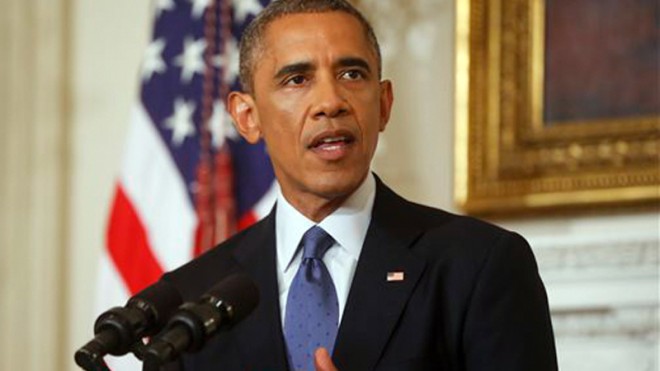Obama cautions against using force to solve crises

In this Thursday, Aug. 7, 2014, file photo, President Barack Obama speaks about the situation in Iraq in the State Dining Room at the White House in Washington. Obama, after years of resisting the pull of more Mideast conflicts, has sent the military back into action in Iraq, where he once accused his predecessor of waging a “dumb war.” U.S. planes on Friday bombed Islamic militants who were towing artillery outside Irbil near U.S. personnel, the Pentagon said. (AP Photo/Charles Dharapak, File)
WASHINGTON — President Barack Obama, faced with deepening crises in the Middle East and Ukraine, is putting the brakes on the notion that American military power can solve either conflict.
While that stance is in keeping with Obama’s long-standing aversion to military entanglements, it comes at a time when the effectiveness of his preferred options is being challenged and there are indications that some in the administration are ready to take more robust actions.
In the conflict between Russia and Ukraine, Obama has relied largely on coordinated U.S. and European Union sanctions to try to shift Russian President Vladimir Putin’s calculus. While the White House can claim credit for inflicting some pain on Russia’s economy, Putin appears to be only getting more aggressive, with Ukrainian officials accusing Russia of sending two military columns across the border Thursday.
During a news conference at the White House, Obama warned that Russia likely will face more Western penalties because of its continued provocations. But he offered no indication that he was considering anything outside the realm of sanctions and explicitly ruled out the prospect of U.S. military intervention.
“We are not taking military action to solve the Ukrainian problem,” Obama said.
Article continues after this advertisementThe president did authorize limited airstrikes earlier this month to go after Islamic State militant targets in Iraq. But the discussion quickly shifted to whether the strikes should extend into Syria, where the militants have a safe haven.
Article continues after this advertisementObama at first seemed to largely rule out that option, a decision that came as little surprise, given his long opposition to plunging the U.S. military into Syria, a country ravaged by civil war. But staying out of Syria got more complicated after the extremists announced last week that they had killed American journalist James Foley and threatened to kill additional U.S. hostages in Syria.
The president has also had to contend with assessments from others in his administration about the need to move into Syria. The most notable statements came from Joint Chiefs of Staff Chairman Martin Dempsey, who said unequivocally that the Islamic State could only be defeated if the U.S. were to go after the group in Syria as well as Iraq.
Obama said Thursday that he was weighing the prospect of military action in Syria, but he tamped down any suggestion that such a move was imminent. And he said that even if he were ultimately to authorize strikes, they would have to come in conjunction with a broader regional strategy that addresses political turmoil in both Iraq and Syria.
“Syria is not simply a military issue, it’s also a political issue,” he said. “It’s also an issue that involves all the Sunni states in the region and Sunni leadership recognizing that this cancer that has developed is one that they have to be just as invested in defeating as we are.”
White House officials said the president felt the need to speak on the situation in Syria on Thursday because of speculation that military action would be taken quickly. But Obama muddied that message by asserting that “we don’t have a strategy yet” for going after the Islamic State militants in Syria, a statement quickly pounced on by Republicans who long have asserted that the president lacks a coherent approach to fighting the extremist group.
“It just confirmed what we’ve been talking about really for almost two years: There has been no real strategy,” Republican Rep. Mike Rogers, the chairman of the House Intelligence Committee, said.
Obama convened a meeting of his top national security advisers at the White House shortly after his remarks Thursday. But officials cast the meeting as more about discussing options than finalizing an approach and said the president was unlikely to make a decision before departing Tuesday for a trip to Estonia and the Nato summit in Wales.
The months-long crisis in Ukraine is expected to be a major focus of discussions among NATO leaders during their two days of talks. Newly elected Ukrainian President Petro Poroshenko was scheduled to attend the summit, where there were likely to be pledges of support for his country’s fledgling government.
Obama and European leaders also were likely to discuss the prospect of tougher sanctions against Russia. The U.S. has made preparations for penalties that could effectively cut off key Russian economic sectors from the West.
But there are concerns among some in the private sector that those penalties could put U.S. businesses at a disadvantage. And European nations, which have an even deeper economic relationship with Russia than the U.S., are also fearful of the possible boomerang effect of sector sanctions.
Obama discussed the prospect of harsher sanctions Thursday with German Chancellor Angela Merkel, who leads Europe’s most robust economy.
RELATED STORIES
Obama vows justice in murder of US journalist